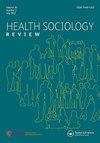职业认同与认知压力:学院补充医学
IF 2.5
2区 医学
Q2 HEALTH POLICY & SERVICES
引用次数: 6
摘要
摘要澳大利亚和英国大学的补充医学和替代医学学位受到怀疑论者的攻击,他们认为这些课程只教授“伪科学”。此外,CAM学者本身也被公开贴上了“庸医”的标签。相对而言,人们对这群横跨CAM实践和学术两个世界的卫生专业人员知之甚少。他们是如何在这些领域之间导航的,他们的集体和个人职业身份是如何构建的?本文通过47次半结构化访谈,探讨了在澳大利亚和英国三个大学CAM学科工作的学者的职业身份:骨病学、脊骨神经医学和中医学。通过分析这些人的叙述,并在之前对学院卫生专业的研究的基础上,本文有助于理解专业知识和专业知识的竞争是如何在学术实践分歧的情况下进行的。通过关注知识主张存在显著争议的领域,它突出了驾驭群体和个人职业身份的“认识压力”的重要性。本文章由计算机程序翻译,如有差异,请以英文原文为准。
Professional identity and epistemic stress: complementary medicine in the academy
ABSTRACT Complementary and alternative medicine (CAM) degrees in Australian and British universities have come under attack from sceptics who argue that such courses teach only ‘pseudoscience’. Moreover, CAM academics have themselves been publicly labelled ‘quacks’. Comparatively little is known about this group of health professionals who span the two worlds of CAM practice and academia. How do they navigate between these domains, and how are their collective and individual professional identities constructed? Drawing on 47 semi-structured interviews, this paper explores the professional identities of academics working in three university-based CAM disciplines in Australia and the UK: osteopathy, chiropractic and Chinese medicine. By analysing these individuals’ accounts, and building on prior research on health professions in the academy, the paper contributes to understanding how contests about professionalism and professional knowledge take place against the academic-practice divide. By focussing on a domain where knowledge claims are conspicuously contested, it highlights the salience of navigating ‘epistemic stress’ for both group and individual professional identity.
求助全文
通过发布文献求助,成功后即可免费获取论文全文。
去求助
来源期刊

Health Sociology Review
Multiple-
CiteScore
7.50
自引率
0.00%
发文量
14
期刊介绍:
An international, scholarly peer-reviewed journal, Health Sociology Review explores the contribution of sociology and sociological research methods to understanding health and illness; to health policy, promotion and practice; and to equity, social justice, social policy and social work. Health Sociology Review is published in association with The Australian Sociological Association (TASA) under the editorship of Eileen Willis. Health Sociology Review publishes original theoretical and research articles, literature reviews, special issues, symposia, commentaries and book reviews.
 求助内容:
求助内容: 应助结果提醒方式:
应助结果提醒方式:


